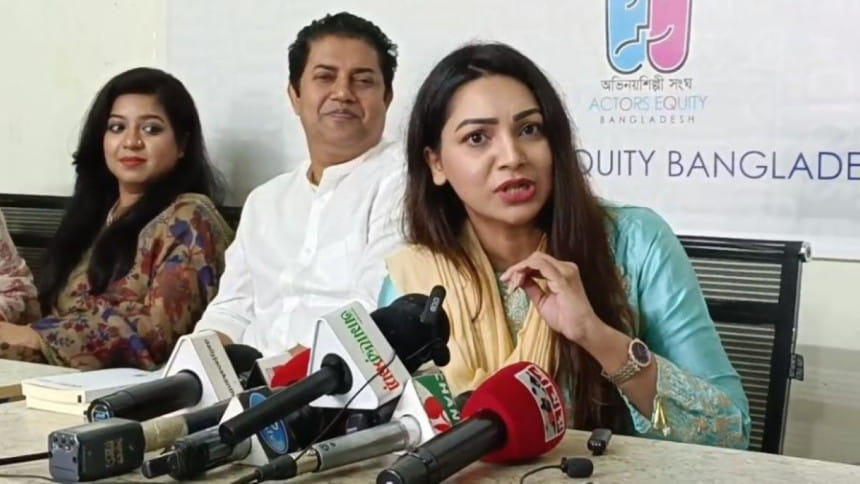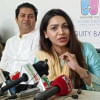'Shangbadik' termed 'shanghatik' for a reason

I was not a student of journalism. However, I always had an innate urge to use whatever potential I was blessed with to do good for society, to bring out hard truths, and speak out for those who could not do so themselves. I wanted to highlight the good and the bad and combine them together to make a difference in any way that I could. And because I knew I could be somewhat good with words, I chose to become a journalist – a profession that, to me, is noble, esteemed, and important for any country to move forward. I learned intently and applied every value of journalism to my work over 13 long years.
I am also a television and film "actress" (female actor) – which seems to be a profession that is under the constant scrutiny of so-called "journalists." I remember when I began my career as an actor and used to state that I was also a journalist, my co-actors would gasp and say, "Tumi shangbadik? Mane shanghatik?" ("You are a journalist? As in, dangerous?")
I felt embarrassed, but I chuckled and nodded because they had reasons to say so which I could not argue with.
On April 1, popular actor Sadia Jahan Prova, at a press conference conducted by the Actors' Equity Bangladesh, spoke out about the immense levels of harassment, of various kinds, by newspeople that she has had to face as a woman in the media. It came as no surprise that she has been a target, as many female celebrities are, for "spicy" and "provocative" news. What she does, where she goes, whom she is with, what she eats, what she carries in her bag – everything became a topic for "journalism." Invading make-up rooms, green rooms, and trying to expose what artistes are up to in their personal lives in the name of journalism (with an absolute absence of ethics) has been rampant. If anyone speaks out against these "reporters," the revenge is a bombardment of more news against the said celebrity.
"I cannot speak out against any form of abuse that I have to endure because I am scared of what the reporters will make out of it. I have requested them from my verified Facebook page that I be consulted before a story about me is published. For example, I had written in a post about the virtues of the month of Ramadan. Somehow, that turned into "Prova finally apologises."
"What should I apologise for? It is society that needs to apologise to me for how it has treated me!" she told the press conference.
The question is, after her privacy was invaded, abused, and made into a national mockery by the media, what should she really apologise for? And to whom? The notion itself is ridiculous. However, ever since she made the statement, which was shared by fellow celebrities on social media, the so-called journalists began feeling "attacked". Instead of righting their wrongs, they chimed in with, "You are also against journalists?"
It is harrowing and absolutely shameful for people in any country to claim to be journalists and work against the people, especially those who are innocent and have not harmed the society in any way. To drag down someone who does not deserve it, to reduce them to an object of public mockery, to do all of this for "spice" in one's news report, only means that the values of true journalism themselves are getting lost. What is more alarming is that these "journalists" and "news portals" tend to attack women more.
A famous businessman allegedly rapes a girl and abets her suicide? Ignored. A girl was involved with that famous businessman? News.
A divorce occurs between a celebrity couple. "Are they doing well?" Ignored. Assumptions of how the woman may have been "responsible for it"? News.
This intentional attack on artistes, especially on women, has been so apparent that the Actors' Equity Bangladesh had to resort to opening up a legal wing to protect their rights. And the only section of society to blame for the situation is none other than "journalists" who are not the least bit bothered about improving and helping society. All they care about are the likes, shares, and views they get while they poison the minds of the people with their vicious and disgraceful "reports." Among entertainment journalists, which I too had once been, I have seen a total disregard for positive news about celebrities until the celebrities themselves reach out to them and ask for such publication. But when it comes to something that could be used to shame the celebrities, "journalists" pounce on it with no regard for verification, respect for privacy or the dignity of the person in question – ethics and values that are taught in journalism schools worldwide, ethics that I did not have to "learn" but practised because I knew better as a journalist.
Ultimately, for the sake of being relevant and "spicy," there are these so-called journalists who forget their moral duties and succumb to the pressure of going "viral." And that is precisely when true and respectable journalism goes out the window.
When you get to be part of a profession that is noble enough to help society move forward and teach people about rights and wrongs, why should you, a journalist, be reduced to something that people need to be afraid of? Why should you become a source of worry? Why should a "shangbadik" turn "shanghatik"? Why are we doing that to ourselves? You tell me.
Naziba Basher is a sub-editor at The Daily Star.

 For all latest news, follow The Daily Star's Google News channel.
For all latest news, follow The Daily Star's Google News channel. 










Comments